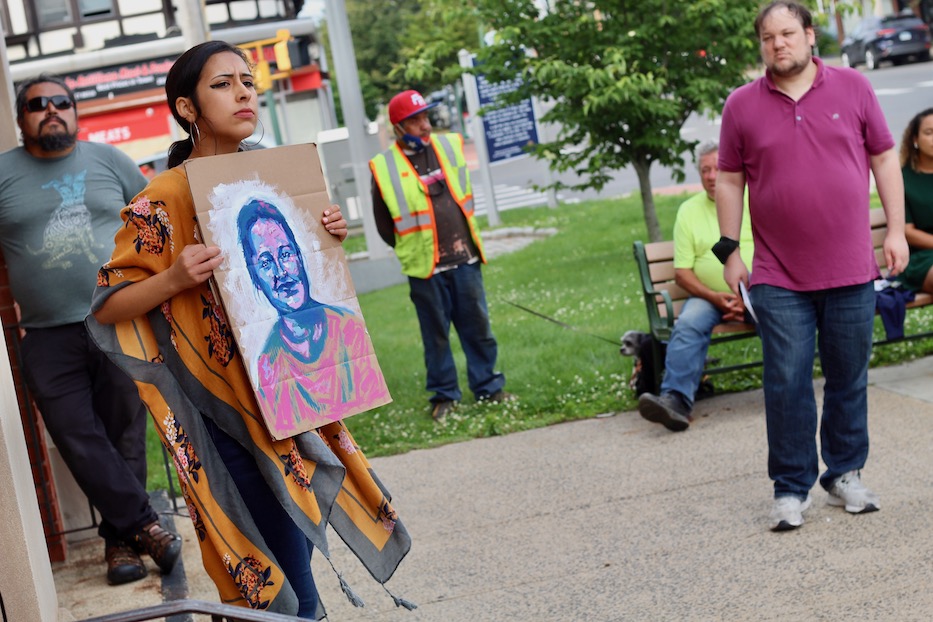
Culture & Community | Immigration | New Haven | West Haven
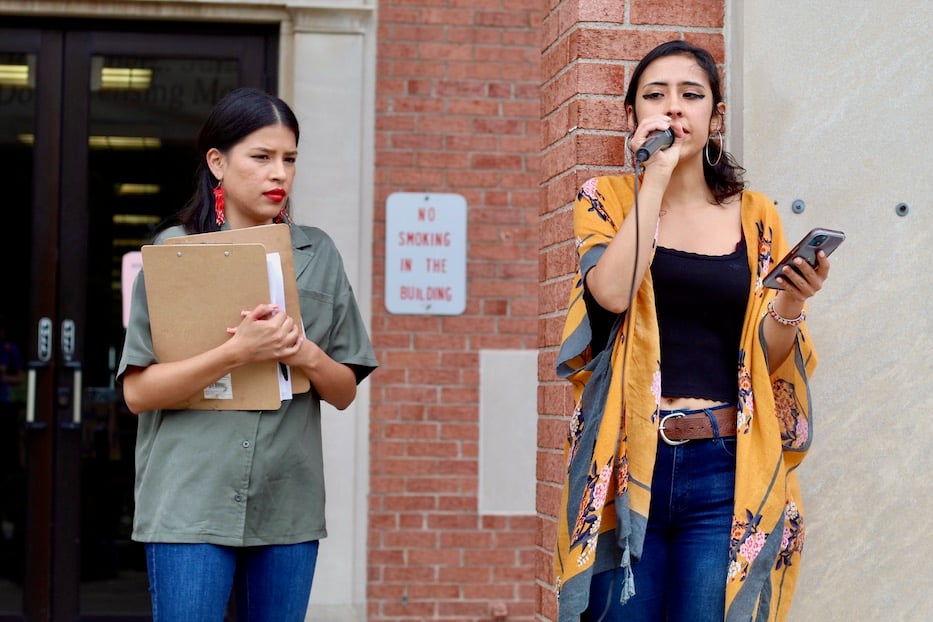
Vanesa Suarez and Camila Güiza-Chavez. Lucy Gellman Photos.
When police discovered Roya Mohammadi's body in the West River earlier this year, her death left a thick, palpable trail of grief and shock that wound from New Haven to Kabul, Afghanistan to Pune, India and back.
Now, almost exactly four months after she was reported missing, organizers are calling for greater police accountability and support from public officials in an investigation they see as taking far too long, with far too few answers.
Those two parts of Mohammadi's life collided Monday afternoon on Campbell Avenue and Main Street, in a rally and vigil outside West Haven City Hall that drew over three dozen organizers, activists, friends, and former colleagues. Surrounded by handmade signs in English and Farsi, freshly painted portraits of Mohammadi, and votive candles, organizers called for justice for a friend and fallen sister, who they described as a victim of both domestic and state violence.
During remarks, several speakers pointed to a history of domestic violence that Mohammadi reported to the West Haven Police Department multiple times in the two years before her death. When she was found in March, Mohammadi was 29, and just a month short of her 30th birthday.
"Women do not turn up dead. Women are murdered," said Vanesa Suarez, founder of Vivan Las Autonomas, noting the epidemic of violence against Native, Black, and Brown women in and beyond American borders. "We are being murdered, okay? We're not falling from the sky and dying like pigeons. And there is nothing that is being done to acknowledge this violence or address it."
.jpeg?width=933&height=622&name=JusticeForRoya%20-%203%20(1).jpeg)
Semilla Collective members Denise Cruz and Javier Villatoro with Havenly Co-Founder Caterina Passoni.
As of this month, the state's Office of the Chief Medical Examiner has reported the cause of Mohammadi’s death as "drowning of undetermined nature." Sgt. Patrick Buturla, public information officer for the West Haven Police Department, said Monday night that the investigation is ongoing and that "our goal has been to determine the events that led up to her passing."
"Any loss of life in our city, it's a tragedy for us and we are committed to uncovering evidence that led to her death," he said in a phone call. He did confirm that no warrants have been issued and no arrests have been made. He said he could not comment further on the case.
For nearly 90 minutes, the rally doubled as a testament to the number of lives Mohammadi touched during her time in Connecticut, and in the years before she came to the state. In person, attendees included representatives of Justice for Roya, Integrated Refugee and Immigrant Services (IRIS), Vivan Las Autonomas, and the Semilla Collective as well as West Haveners and New Haveners who simply heard about the event and come to show their support.
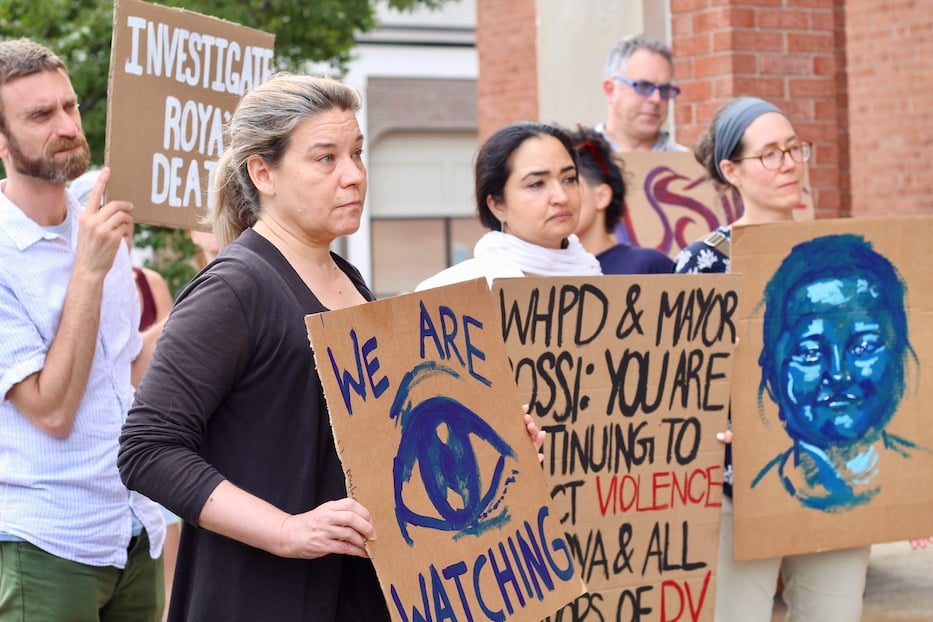
From afar, Mohammadi's younger siblings Shamim, Khalida and Fayaz Mohammadi sent written and recorded statements calling for justice and due process in their sister's death. All expressed frustration with how little they have heard from the West Haven Police Department, despite trying to get involved across the distance. In particular, they too have expressed concern about violence that Mohammadi was experiencing in the apartment where she lived with an aunt and uncle.
Monday, speakers stressed that they both want people to know who Mohammadi was in life, and how and why she was taken from them so prematurely in death.
Born and raised in Kabul, Afghanistan, Mohammadi was a beloved eldest child and doting older sister to four siblings, with stories of home that ultimately followed her halfway around the world. When she was 18, she left home to pursue degrees in business and marketing at Savitribai Phule Pune University in Pune, India. A third degree at the University of New Haven, which she was not able to complete, drew her to the U.S. in 2019.
From the time she moved to Connecticut to the time of her death, Mohammadi lived with an aunt and uncle in West Haven, in an apartment not far from the Boston Post Road. Multiple times, she reported verbal and physical violence at the hands of her uncle to the West Haven police, reports from which Suarez read aloud on Monday.
.jpeg?width=933&height=622&name=JusticeForRoya%20-%202%20(1).jpeg)
Camila Güiza-Chavez with a portrait of Roya Mohammadi from New Haven artist Jisu Sheen.
In the reports, police also record at least one arrest of her uncle, which took place last July. In the same accounts, Mohammadi reported feeling afraid for her safety, having her phone taken away by her uncle several times, and being punched in the face.
If you knew her, multiple speakers said Monday, you knew more about her grace, effusive warmth and ambition than what was happening at home. Mohammadi, who was fluent in Urdu, Farsi, Pashto, English, and German, loved to joke around, to tell stories about her siblings, to gush over her love for old-school cartoons and Marvel movies alike. As a translator, she became an expert in close and empathetic listening, learning the nuances of every story as she relayed them in real time.
In September of 2022, she walked into Havenly, where she soon became a translator, for the first time. She had been referred to the space by the organization BH Care, remembered Havenly Co-Executive Director Camila Güiza-Chavez. The nonprofit works with people experiencing domestic violence. While she joined the staff as an interpreter in Farsi and Pashto, Mohammadi quickly became a friend and confidant.
"We were immediately struck by her determination and by the clarity with which she expressed the path she was creating for her life," Güiza-Chavez said. "Calling Roya an interpreter for Havenly does not begin to capture the role she came to play in our community. She poured her heart and energy into our community space, showing up every day with such kindness, dedication and open heartedness."
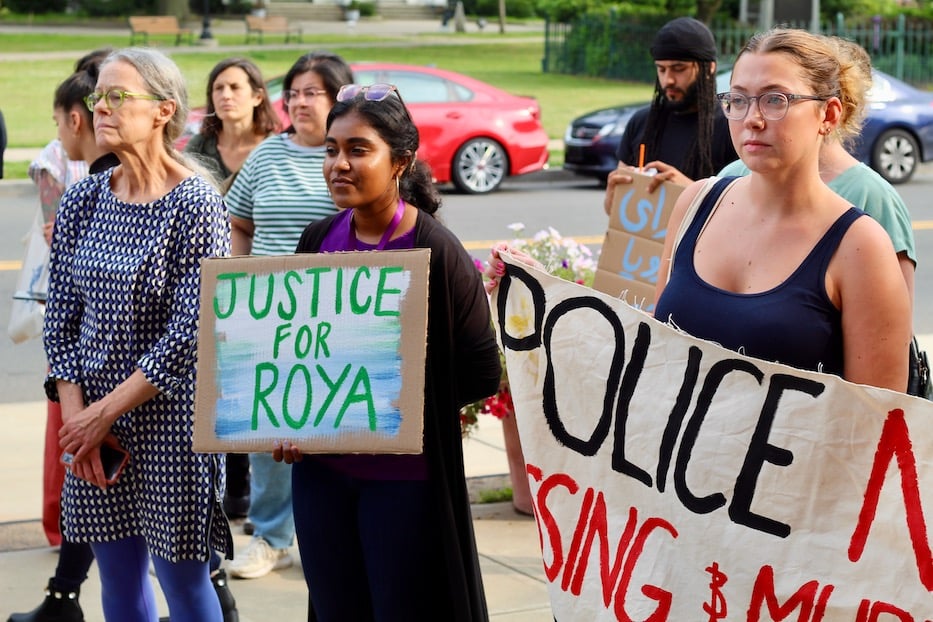
At Havenly, Mohammadi became a translator, a peer, and a beloved confidant to many of the refugee women who worked there. Earlier this year, she was also named a member of Havenly's first "Career Bridges" fellowship program, a new initiative at the organization designed for women with significant prior professional experience. During a vigil in March of this year, friends and colleagues remembered her ambition and willingness to try new things, whether in the classroom or the real world.
So when she did not show up at Havenly to translate for an exam on Feb. 26, her colleagues became alarmed. On March 2, several of the women at Havenly reported her missing. A day later, Güiza-Chavez received a call that her body had been found in the West River. The friend they loved was, suddenly and inexplicably, gone.
"Roya touched the lives of so many people here," Güiza-Chavez said. "She volunteered as an interpreter for many different social service organizations, she spoke on panels, she showed up in moments of crisis for others. She cared deeply about others and left a deep impression on this community. The force of her heart and her spirit were like a pebble tossed into a river, with ripples going outward and outward and outward."
"We Did Not Need To Get Here”
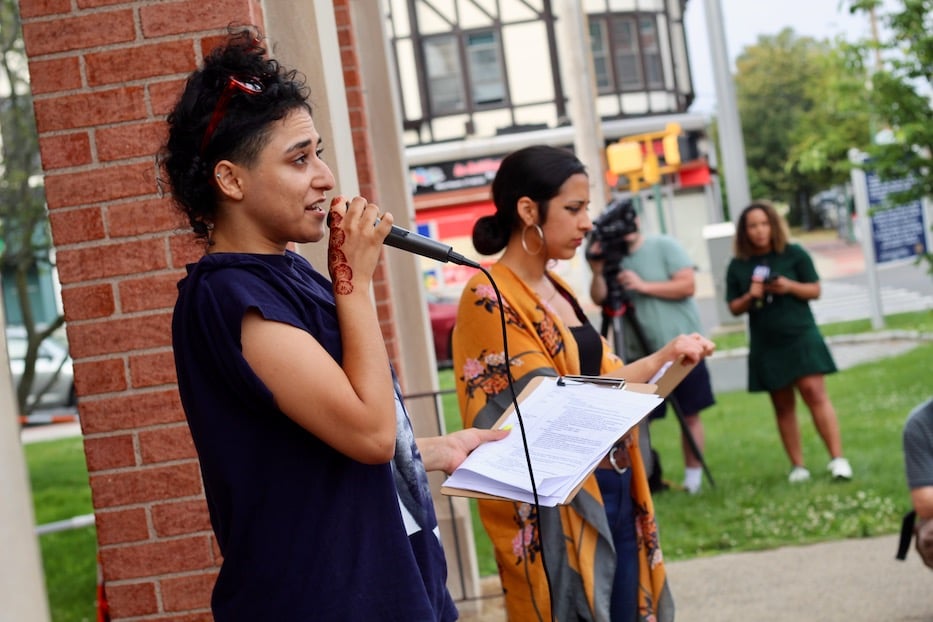
Nika Zarazvand: "This is a preventative act."
Since March, friends, colleagues, advocates, organizers and survivors of domestic violence have made dozens of calls to the West Haven police, receiving what they described Monday as few answers around the investigation into her death. Three of Mohammadi's siblings also said they have made multiple attempts to speak with the West Haven police with little success.
"She still has the right to let everyone know that she didn't kill herself," said her sister Khalida, the second eldest in the family, in an audio message. "In America, they take a person's life. We want justice for Roya Mohammadi. We want everyone to know Roya Mohammadi has dreams, and they needed to be fulfilled."
In multiple conversations with one officer assigned to the case, Det. Jon Suraci, Güiza-Chavez said she has also faced considerable racism, misogyny and anti-immigrant sentiment directed at Mohammadi. She said that multiple times, he has questioned Mohammadi’s character, and asked why she didn’t simply leave the situation. Güiza-Chavez stressed how difficult it is for a newcomer to this country to simply leave a situation with little to no economic support.
“Why is that even part of the conversation?!” she yelled, louder than the cars passing at the corner. “It doesn’t matter! It shouldn’t even matter. It doesn’t matter her character … we are all innately born with the right to life, to a long life free of violence.”
.jpeg?width=933&height=622&name=JusticeForRoya%20-%206%20(1).jpeg)
Chantre asked aloud why she and Mohammadi could listen with more nuance as interpreters than the West Haven police.
Monday, speakers also introduced a new list of demands (read them in full here) including "that her case be investigated [by the West Haven police] thoroughly, given that she was experiencing domestic violence," and that elected officials on the municipal, state, and federal levels become more involved.
These include but are not limited to New Haven Mayor Justin Elicker, West Haven Mayor Nancy Rossi, West Haven State Rep. Dorinda Borer and U.S. Sens. Chris Murphy and Richard Blumenthal. The only official present Wednesday was West Haven City Council member Victor Borras, who is running as a first-time Democratic candidate for mayor of the town.
“They [officials] need to take concrete actions to prioritize the lives and wellbeing of women,” organizer Nika Zarazvand said. “This is a preventative act. It does not start after a woman has been murdered. We did not need to get here. It is unacceptable for public officials to remain silent and ignore women who are found dead in the cities and states they represent.”
“They cannot be our public officials if they do not represent us when we are killed,” Zarazvand added. “We’ve been through this before. We’ve done this before. They’re [police] not gonna do this on their own.”
.jpeg?width=933&height=622&name=JusticeForRoya%20-%205%20(1).jpeg)
Dowd: "Roya did try and get help. And I believe that her advocate probably did the best they could with what they had, which is close to nothing.”
Multiple attendees, some speaking during an open mic portion of the rally, stressed the importance of fighting for Mohammadi to help those grieving find some sort of peace, and end a cycle of violence that extends from economic injustice and misogyny to law enforcement’s lack of trauma-informed response to sexual violence. Suarez, who fought a similar battle after the disappearance and death of Lizzbeth Aleman-Popoca in 2020, pointed to how hard it is to grieve when family, friends and supporters also don’t have closure.
Havenly Co-Executive Director Jane Dowd pointed to how few resources domestic violence organizations and advocates currently have. Prior to her time at Havenly, Dowd worked as an advocate, including at the The Center for Family Justice in Bridgeport.
“There isn’t enough money to even try and fix this before it even gets to the police,” she said. “There is no investment in protecting women, protecting men, protecting anybody in intimate partner violence, family violence … from the top down, it is not taken seriously. Roya did try and get help. And I believe that her advocate probably did the best they could with what they had, which is close to nothing.”
.jpeg?width=933&height=622&name=JusticeForRoya%20-%204%20(1).jpeg)
Rona Rohbar, herself an Afghan immigrant who is now a health coordinator for IRIS, pushed for more transparency from the West Haven police and from law enforcement more broadly. While she did not know Mohammadi, she said, she didn’t have to to recognize what she faced on a daily basis—the two are from the same part of the world.
“This is not enough,” she said. “We need answers. We need clarity. We don’t want anyone to take advantage of this. It’s not a political thing. It’s not a racial or a cultural thing. It’s a domestic violence case, and the answers they have are not enough for us. We need clear answers. We need justice for her.”
Catherine Chantre, who is a doctoral candidate in epidemiology at the Yale School of Public Health, remembered working alongside Mohammadi as an interpreter. When one is doing translation work, “you’re supposed to listen to someone’s story, you’re supposed to listen to what they say, and in the process you listen to every single detail,” she said.
“You listen acutely and attentively, so you will not miss a single thing,” she said. “If we’re doing that at a community center and there are people that are literally trained to do this for a living and they just can’t do it right? It just doesn’t make sense.”
The day that she learned Mohammadi had died, she felt like the whole floor had been pulled out from under her. She expressed shock and frustration that the investigation has not delivered faster results. “No matter what the outcome was, she was a person who had dreams, who had a life, and it will stay with us,” she said. “I just beg that they care about Roya because we do … her life mattered.”
From across an ocean, her siblings vowed to also keep fighting for their sister.
“Blessed are they who maintain justice, who constantly do what is right,” wrote Mohammadi’s younger sibling, Fayaz. “My sister was my only hope in life. She was like my mother. She always thought about the future. The only reason I’m here is because of my sister. If humanity is still alive, if you fear God, then follow the law, be fair, do justice.”

